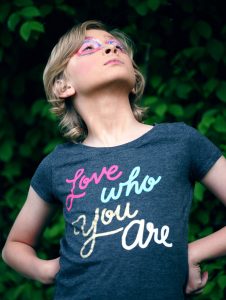
She was only 14 years old with big eyes and a smile full of braces. She started off a little flustered because she was late, since her teacher had technology challenges getting her onto Zoom.
She made great eye contact, sat up tall, and spoke clearly and passionately about her dreams and what she had already accomplished, having trained in dance since she was only two years old. She had excellent grades. Then she said out of the blue, “But I don’t have any self-confidence.”
What? I looked at her and explained that didn’t appear to be the case. I explained all the ways she was demonstrating self-confidence.
I was volunteering to help high school students practice for future job interviews, and the administrators told me I was limited to just 10-15 minutes with each student.

The next 14-year-old young lady came on Zoom, sitting up straight, and told me about her love of school sports (she was a part of several athletic teams), and how proud she was of being able to hold a job while in school. Then she offhandedly said, “Though I lack self-confidence.”
What was going on here?! I never asked either of these young ladies about their weaknesses. I don’t even use that term when I interview anyone. I told her how proud she should be of her accomplishments, since she just shared with me how hard it was learning her new job and how she now excels at it and really enjoys it.
Next, I met a 14-year-old young man who slumped down a bit in his chair and quietly shared his love of astronomy. He waited until I asked questions and then easily told me about himself—his love of math and how he helped out his neighbor during the pandemic.
For the last interview, another 14-year-old young man appeared before me. He was larger and took up a lot of the screen. He started off by telling me he was on the football team, and how he was going to be a dentist. He communicated clearly and with purpose. I asked him about his passions, and he mentioned reading and writing. Being married to a writer, I encouraged him to keep that passion alive alongside his career aspiration of dentistry.
So, what stood out in these mock interviews with these young high school students? You’ve guessed it by now. Neither of the young men mentioned anything about lacking self-confidence. Did they question themselves? Maybe. Maybe not. But they never brought it up. Both young women, however, shared their feelings of self-doubt, unprompted.
The meeting I had prior to this interview session was with more than 20 female business professionals for our monthly networking group. The presenter asked a question about how comfortable the women felt on video. I watched the chat and was shocked.
Within a matter of two hours, I heard women from ages 14 into their 70s all share how they beat themselves up with judgment.
Are men experiencing this too? Yes, I know men question themselves. I know many open and honest men who freely share their concerns, but I’ve never once heard them publicly say, “I lack self-confidence,” or “I hate the sound of my own voice.”
Starting in the 1970s and running for over thirty years, the comic strip “Cathy,” by Cathy Guisewite, brilliantly illustrated how modern women dealt with the “four basic guilt groups” of life—food, love, family and work. It was always funny and helpful to learn that so many women shared the same insecurities.
I teach Mindfulness, which is a practice of paying attention moment by moment to our lives with non-judgment. It is very easy to learn, and you have the ability to choose every day whether you want to practice it or not.
I want to invite you to begin to practice right now.
Pause and see if you can be a bit less judgmental toward yourself.
Instead of being critical, try replacing that with gratitude for how you have your own strong, wonderful voice.
And then please share this practice of compassion with the young ladies (and men) in your life!
Above photo credit: Sharon McCutcheon –Unsplash
Provide a life-changing program for your employees and create a healthier more collaborative and engaged workplace.